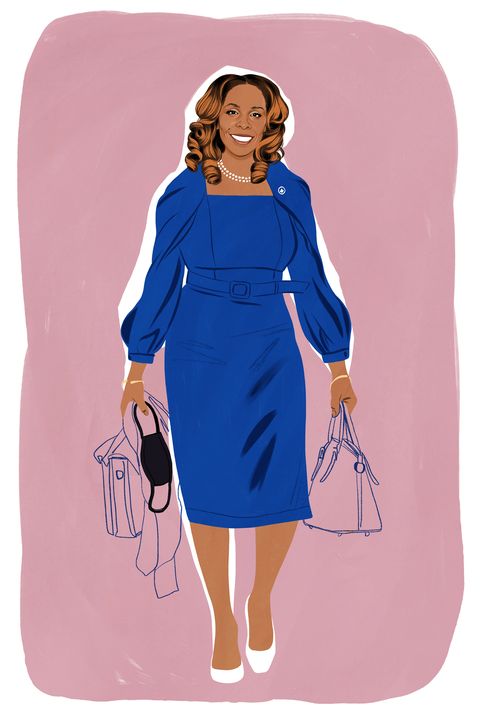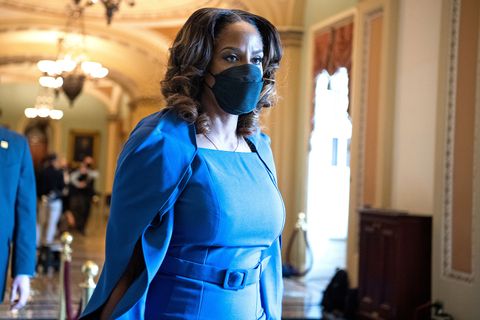Stacey Plaskett, the House delegate from the U.S. Virgin Islands, entered President Trump’s second impeachment trial with a crucial task: As an impeachment manager, help prove that Trump had incited an insurrection at the Capitol on Jan. 6. She emerged a breakout star, with people commending her well-crafted argument and comparing the stunning blue dress she wore to a Superwoman costume.
ELLE‘s series Clothes of Our Lives decodes the sartorial choices made by powerful women, exploring how fashion can be used as a tool for communication. We sat down with Plaskett to find out what you wear when the whole world is watching.
Going into that Senate trial, all of the impeachment managers saw ourselves as doing our duty to our country. We took this as service above self. I know that sounds trite, but that’s what we felt as we were preparing.
The first day the people saw me, I was presenting demonstrative evidence—videos, security clips, tweets, thing we found on social media. Having been a former prosecutor, I had a lot of experience with introducing evidence to a jury. Then the second time I spoke was during the question and answer period. We had to come up with every possible question that could be asked and develop answers for all of them. We had to know the facts cold.
This content is imported from YouTube. You may be able to find the same content in another format, or you may be able to find more information, at their web site.
All of us felt that we were presenting not just to those 100 senators and to the American people, but to the world. We were showing that our democracy was still intact, that there was a process by which America could rectify its own internal ills, as well as those who would attempt to try and thwart our democracy for their own self interests. That was foremost in my mind. I also recognized that I was the only Black woman in that room. I had to represent not just women and women of color and African-American women, but my community that sent me to Washington. The Virgin Islands has a lot of disenfranchisement and a lot of inequity. In being an impeachment manager, I had to elevate them and demonstrate to the world that good things can come out of small places.
When I was thinking about what to wear for the trial, I knew it was important, but I wasn’t really focused on it. My mother came to New York from the Virgin Islands in the 1950s and was very focused on fashion. She was a trunk model, and she’d spend every lunch hour in department stores, like B. Altman and Saks Fifth Avenue. So much of my childhood was spent in these stores with her. She had relationships with the buyers and was always turning dresses inside out to look at the seams and the quality of the sewing. For special holidays, she’d make mother-daughter dresses for us. I ended up hating fashion because it took up so much time. I’m embarrassed to say that, even now, my mother still picks out some of my clothes.
The trial began on a Tuesday, and that Sunday night, I got a call from some of my friends that I’ve known since college. They asked, “What are you going to wear?” I told them I don’t know, I guess I’ll pull a couple suits from my closet. They said, “That’s not an option,” and decided we were all going to meet on Monday. I brought all my clothes, and they pulled my outfits together.
But there’s one thing I always insist on when I’m doing presentations like this: high heels. It started when I was a prosecutor. I’m six feet tall, and when I would wear heels and a judge would call us to the bench, I could stand there and be at eye-level with the judge, while the defense attorney was usually much lower. I felt when the jury saw that, it gave a level of equality to what I was saying as a prosecutor.
From them on, when faced in pitted debates or court cases or serious presentations, I’ve worn high heels. At the impeachment trial, when I went up to speak on my first day, I was the only person who made it a point to raise the podium. I wanted the senators to know, in essence, that I was not an average person, that what they were about to hear was coming from someone who’s not your average Joe.
This content is imported from Twitter. You may be able to find the same content in another format, or you may be able to find more information, at their web site.
As for the dress, that was very intentional. I don’t usually wear things that are that form-fitting, but my friends and I had a long discussion about retaining femininity, that I’m 54 years old, and I don’t know how much longer I’m going to have this body, so I might as well flaunt it before it falls apart. They gave me confidence to go ahead and wear a dress like that. I also thought it was a way of subtly thumbing my nose at the dress code because women have been told they can’t wear sleeveless dresses. This dress, the way the sleeves were cut, when I moved my arms certain ways, some skin was exposed.
When people started comparing my dress to a Superwoman outfit, I was embarrassed. I have this theory that most women see themselves the same way they were as middle schoolers. In middle school, I was the awkward, gangly kid in class, so I’m not comfortable with having attention on me. Having people pay attention to my looks or my clothing always makes me more uncomfortable than if people were paying attention to my intellect or to my presentation.
After the trial, losing was absolutely heartbreaking. We don’t like to admit it, but after the vote came in, the group shed some tears in the back room. But the polling afterwards demonstrated that we did convince the American people. We convinced the world what the president had done.
I do believe that, but for that trial, there would be potentially an opportunity for Donald Trump to run again. But I think, because of the evidence presented on the Senate floor, if he attempted to run again, it would be unsuccessful.
We also showed that the system does work. There’s a reason our Founding Fathers created the two-thirds requirement for impeachment, rather than just having a simple majority in the Senate. But I hate that our politics have gotten to such a place where it’s so difficult for senators to follow their duty over their party. There were senators who said to me that we made our case and we did an excellent job, and then voted against it. In the end, we felt we did the right bit. And we fought with everything we had.
This interview has been lightly edited and condensed for clarity.
This content is created and maintained by a third party, and imported onto this page to help users provide their email addresses. You may be able to find more information about this and similar content at piano.io


